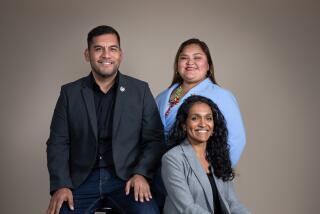Eunice Sato, first female and only Asian American mayor of Long Beach, dies at 99
- Share via
When Long Beach Mayor Eunice Sato learned that a house shook whenever a city transit bus drove by, she invited herself into that home to experience it for herself.
It turned out the homeowner wasn’t exaggerating.
“He called every city department and nobody paid attention,” said Marynelle Evans, who served as Sato’s legislative assistant beginning in 1977. “He had had it and he wanted to talk to the mayor.”
Sato asked Public Works to investigate and they later learned it was a sinkhole in the making that could’ve caved in at any moment. They filled up the hole and solved the homeowner’s problem.
“She was a petite package — 4-foot, 10-inch — but she was packed with intelligence and spunk and principles and she just ran full speed ahead all the time,” Evans said. “She just went for it.”
Sato, the first woman and only Asian American to hold the title of mayor in the city of Long Beach, died Feb. 12 of cardiopulmonary arrest at a residential care facility in Bixby Knolls, her daughter Charlotte Sato said. She was 99, four months away from her 100th birthday and one day from getting her second dose of the COVID-19 vaccine.
“She held the city together,” said Beverly O’Neill, who was mayor of Long Beach from 1994 to 2006. “She was so well received and she was always prepared. She didn’t talk loud but when she talked, everyone listened.”
Sato was elected to the City Council in 1975 as the 7th District representative and served as mayor for two years beginning in 1980. During her tenure, Sato helped revitalize the city’s downtown.
“There were drugs, prostitutes, closed-down stores, dirty sidewalks,” Sato said during a 2009 interview with the Historical Society of Long Beach. “It was the dumps.”
The council agreed to pour money into the area to bolster the city’s urban core and helped grow business. The Long Beach Plaza shopping center was built and opened in 1982, though it was torn down in 2000. The Hyatt Regency also helped put the city’s hotel and convention trade back on the right track, setting the tone for future luxury hotels such as the Ramada Renaissance and Queensway Bay Hilton.
Sato said the city’s downtown wouldn’t be what it is now had it not been for the council’s efforts.
All the while, Sato attended to her constituents’ concerns, including noise from the Long Beach Airport and truck traffic heading to the port, and encouraged residents to do their part by maintaining their property.
“She spent a great deal of time tending to her constituent complaints,” Charlotte Sato said.
Before the trailblazer shattered glass ceilings, Eunice Sato experienced hardship early on.
Her family was forced out of their Northern California home in Livingston during World War II when President Franklin D. Roosevelt ordered that Japanese Americans along the West Coast be rounded up and taken to prison camps. Her family packed their belongings into a little trailer and fled to Colorado to find refuge at her older sister’s home.
At 27, she wrote about the pride she felt of being Japanese American when she was looking for a job through Columbia University’s placement office. Decades later, she donated $20,000 to the Japanese American Citizens League, an Asian American civil rights organization.
“It isn’t necessary or required that I reveal my background, but I do that because I am neither ashamed of it nor afraid to face any obstacles or discrimination as a result,” Sato wrote. “I am convinced that if one community is too narrow and prejudiced to have me because of my cultural background, there will be another somewhere that believes in true democracy and desires to see it in action as well as in words.”
Sato dreamed of becoming a nurse but found herself teaching high school students in Michigan for three years. She later traveled to Yokohama, Japan, in 1948 as a missionary to teach English at a private school.
After getting married and having three children, Sato and the family moved to Long Beach in 1956. Sato was involved in volunteer programs and worked as a PTA mom and president of the Long Beach Council of Churches before she was encouraged to run for a seat on the City Council.
Sato remained active in her community after her stint in politics and despite two mastectomies. She was president of the youth organization California Conference for Equality and Justice. Then-Gov. George Deukmejian appointed her to three different state commissions and in 1991, then-President George H.W. Bush appointed her to the National Advisory Council on Educational Research. She spent her last years involved at Grace First Presbyterian in Long Beach.
“She was a straight arrow,” Charlotte said. “She was just doing what was right.”
Sato is survived by her daughter and two sons.
More to Read
Start your day right
Sign up for Essential California for the L.A. Times biggest news, features and recommendations in your inbox six days a week.
You may occasionally receive promotional content from the Los Angeles Times.







